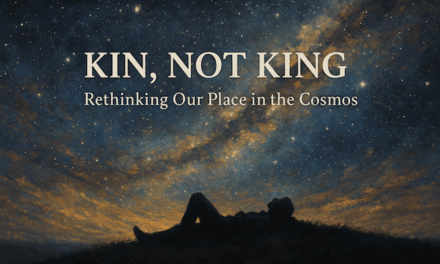Introduction
The Enlightenment of the eighteenth century revolutionized human thought, shaping modern science, governance, and social structures. Through its embrace of reason, individual rights, and the pursuit of objective knowledge, it laid the foundation for Western modernity. Yet, today’s world is defined by global crises—environmental degradation, social fragmentation, political polarization, and a crisis of meaning—that expose the limitations of these Enlightenment ideals. In response, a diverse group of thinkers across disciplines is advocating for a new paradigm that moves beyond the reductive materialism, individualism, and rationalism that have long defined Western thought. Just as the Enlightenment brought about profound shifts in the way we understand the world, this emerging intellectual movement calls for an integrative, holistic approach that is equally revolutionary.
This article explores the trends and some of the thinkers driving this shift and argues that we are on the cusp of a new historico-philosophical era that can address the complex, interconnected challenges of our time.
Science: From Reductionism to Complexity and Interdisciplinarity
Enlightenment Context: The Scientific Revolution and Enlightenment promoted reductionism as the key to understanding the world. Enlightenment science embraced linear causality and mechanistic thinking, viewing the universe as a predictable machine that could be fully understood by breaking it down into its constituent parts.
Current Shifts: Today, there is a growing recognition of the limitations of reductionism. Complex systems, non-linear dynamics, and emergent properties reveal that reality cannot always be fully understood through isolated analysis. Fields such as quantum mechanics, systems biology, and ecology challenge materialistic assumptions and underscore the importance of interdependence and holistic thinking. The shift from understanding the world as a machine to seeing it as a complex, self-organizing system is a foundational change that reflects broader cultural transformations.
For example, Iain McGilchrist’s work in “The Master and His Emissary” and “The Matter with Things” critiques the dominance of left-brain analytical thinking and argues for a return to right-brain modes of understanding that emphasize connection, intuition, and the whole over fragmented parts. Similarly, Adam Frank, Marcello Gleiser, and Evan Thompson in “The Blind Spot” point out the inherent limits of a scientific knowledge that ignores the human perspective and forgets it is human experience that makes science possible.
This evolution in scientific thought is also reflected in the rise of interdisciplinary approaches, where knowledge is integrated across domains rather than isolated into silos. The emerging focus on systems thinking and complexity science offers a more nuanced view of reality that embraces uncertainty and interdependence.
Secularization and Individualism: Re-assessing Spirituality and Social Cohesion
Enlightenment Context: The Enlightenment promoted secularization and the primacy of the individual. The separation of church and state and the elevation of rationality over spirituality led to the decline of organized religion’s influence and the rise of individualism as a cornerstone of Western liberal democracies.
Current Shifts: The spiritual vacuum left by the Enlightenment’s secularization and the emphasis on individualism have contributed to widespread social atomization and a crisis of meaning. Rising mental health issues, increasing loneliness, and growing political polarization highlight the dangers of unchecked individualism. In response, there is a resurgence of interest in spirituality, non-dogmatic forms of religion, and a renewed appreciation for the humanities as essential for fostering social cohesion and understanding human values.
Thinkers like John Vervaeke explore how the “meaning crisis” is a direct result of the erosion of shared spiritual and communal frameworks. In his series “Awakening from the Meaning Crisis,” Vervaeke discusses how practices like mindfulness, wisdom cultivation, and non-dogmatic spirituality are essential for addressing this existential void. Similarly, Jeffrey Kripal in “The Flip” argues for a synthesis of science and spirituality, suggesting that transformative experiences challenge the materialist view of consciousness and offer a gateway to deeper meaning.
This shift represents a move toward reconciling individual freedom with collective flourishing, as seen in the rise of communitarian philosophies and holistic approaches to well-being. The re-evaluation of secularization’s legacy aligns with a broader cultural movement toward integrating spirituality with reason, science, and ethical living.
Cognition and Reason: The Limits of Rationality and the Rise of Embodied Cognition
Enlightenment Context: The Enlightenment’s emphasis on reason and rationality was foundational to its intellectual project. Rationality was viewed as the ultimate tool for human progress, while emotion, intuition, and embodiment were often sidelined as inferior forms of knowledge.
Current Shifts: Advances in cognitive science increasingly reveal the limits of pure rationality. Research shows that human cognition is deeply embodied, affective, and situated within environmental and social contexts. Theories of enactivism, neurophenomenology, and embodied cognition challenge the Enlightenment’s ideal of the rational, disembodied mind.
For instance, Evan Thompson’s work on embodied mind theory emphasizes that cognition is not a detached process but one deeply intertwined with our bodily states and interactions with the world. Similarly, George Lakoff highlights how metaphors shape our thought processes, demonstrating that human reason is not purely logical but structured by embodied experiences. Lisa Feldman Barrett’s research on emotions challenges the classical view, showing that emotions are not hardwired but are shaped by culture and environment.
These insights call for a more integrated understanding of human experience that recognizes the interplay between rationality, emotion, and embodiment. The shift from viewing the mind as a disembodied calculator to seeing it as an enactive agent within a complex system marks a significant departure from Enlightenment thought.
Political Philosophy: Liberal Democracy’s Struggles and the Need for New Governance Models
Enlightenment Context: Enlightenment political thought laid the foundation for liberal democracy, emphasizing individual rights, representative government, and the rule of law. This model became the dominant political framework in the Western world, particularly after the collapse of the Soviet Union, which was seen as the triumph of liberal democracy.
Current Shifts: The inadequacies of liberal democracy are becoming increasingly evident in the face of global challenges such as climate change, rising inequality, populism, and the erosion of trust in institutions. The complex, interconnected nature of today’s crises demands governance models that transcend nation-states and short-term electoral cycles.
The search for new governance models is gaining traction in concepts like bioregionalism, cosmopolitan democracy, and regenerative politics. These models emphasize adaptive, participatory, and integrative approaches capable of addressing the interconnected crises humanity faces. Harvey Whitehouse’s work on group identity and Kate Raworth’s doughnut economics framework exemplify this shift, highlighting the need for governance structures that prioritize ecological and social sustainability over narrow economic metrics.
As liberal democracy struggles to cope with twenty-first-century challenges, these emerging ideas suggest that the next phase of political thought may involve a synthesis of local and global, individual and collective, in governance models that are more resilient and responsive.
Economic Thought: From Materialism to Intangibles and Ecological Economics
Enlightenment Context: Classical economics, influenced by thinkers like Adam Smith, posited that rational self-interest, free markets, and capital accumulation would lead to optimal social outcomes. The Enlightenment’s faith in progress was mirrored in the belief that endless economic growth was both possible and desirable.
Current Shifts: The rise of intangible assets (knowledge, data, intellectual property) challenges traditional economic models based on physical goods. Moreover, the recognition of planetary boundaries and the urgent need to address environmental degradation demand a new economic paradigm.
Ecological economics, doughnut economics, and degrowth movements argue for an economy that values sustainability, well-being, and the regeneration of natural systems over perpetual growth. Amartya Sen has long advocated for an approach to economics that centers human well-being rather than just GDP. Kate Raworth’s doughnut model offers a framework that balances human development within ecological limits, redefining progress in terms of health, equity, and sustainability.
This transition from extractive capitalism to regenerative economies marks a significant departure from Enlightenment-era economic thought, moving toward a system that recognizes the interconnectedness of human prosperity and planetary health.
The Knowledge Paradigm: From the “Religion of Knowledge” to the Awareness of Ignorance
Enlightenment Context: The Enlightenment championed the accumulation of knowledge as the key to human progress. The belief in objective, universal truths and the linear expansion of knowledge drove scientific inquiry, education, and technological development.
Current Shifts: The information explosion in the digital age has led to what some call the “paradox of knowledge”: as information grows, so too does confusion, misinformation, and ignorance. The recognition that knowledge is always partial, context-dependent, and sometimes weaponized is leading to more critical approaches to knowledge production.
John Vervaeke’s work on relevance realization and Marcello Gleiser’s emphasis on the limits of scientific knowledge underscore the need for a more humble, reflexive, and ethical approach to inquiry. The proliferation of post-normal science and the epistemology of ignorance highlight that creating knowledge often goes hand-in-hand with creating blind spots, uncertainties, and biases. The popularity of Rory Stewart’s podcast, “The Long History of Ignorance”, points to the growing acceptance of this understanding.
This awareness of the limits of knowledge calls for a shift from viewing knowledge as an end in itself to understanding it as a tool for wisdom and ethical living. The new paradigm emerging emphasizes co-creation, plurality, and the cultivation of wisdom over the mere accumulation of information.
The Culture Wars: Signs of a Paradigm Struggle or Distractions?
While shifts toward complexity, interconnectedness, and holistic thinking are gaining momentum, the ongoing culture wars, cancel culture debates, and tensions surrounding progressive activism and free speech cannot be dismissed as mere distractions. These phenomena are symptomatic of a deeper paradigm struggle between competing worldviews: the established Enlightenment ideals that prioritize individual rights, reason, and free inquiry, and an emerging framework that emphasizes collective ethics, social justice, and the responsibilities that come with interconnectedness.
The Clash of Worldviews
At the heart of the culture wars is a tension between traditional liberal values—centred on free speech, individualism, and universal principles—and newer ethical frameworks that prioritize inclusivity, systemic justice, and the protection of marginalized voices. The Enlightenment’s emphasis on individual rights and rational debate is increasingly challenged by perspectives that question whether these ideals are sufficient in addressing deeply rooted social inequities.
For example, debates around cancel culture and free speech reveal this clash. Supporters of unrestricted free speech argue that open debate is essential for intellectual progress, a principle inherited from the Enlightenment. On the other hand, those who advocate for stricter boundaries on harmful or offensive speech highlight the need to protect vulnerable communities and rectify historical injustices. This reflects a shift toward balancing freedom with collective well-being, which is central to the emerging holistic paradigm.
The Postmodern Legacy and Its Role in the Culture Wars
Postmodernism’s critique of objective truth and its emphasis on the social construction of knowledge have fuelled the fragmentation of shared narratives, contributing to the polarization we see today. The questioning of universal truths and the focus on power dynamics have led to an environment in which competing “truths” and perspectives clash without easy reconciliation. This dynamic is evident in the polarized discourse surrounding issues of identity, social justice, and the politics of recognition.
However, the culture wars can also be seen as the growing pains of a society transitioning from one worldview to another. The tension between universalism (e.g., free speech as an absolute right) and contextualism (e.g., recognizing that speech impacts people differently based on their social position) is part of the larger negotiation over what values should guide us in the new era.
Progressive Activism and the New Ethical Paradigm
The rise of progressive activism (sometimes described pejoratively as “wokery”) is another manifestation of this paradigm struggle. At its core, the movement toward social justice and heightened awareness of issues like systemic racism, gender inequality, and environmental justice aligns with the holistic values of interconnectedness and empathy. Critics often label these movements as overly moralistic or authoritarian, while proponents argue that they represent a necessary corrective to centuries of oppression and marginalization.
The backlash against progressive activism and the resistance to cultural change are not simply reactions to new social norms but reflect a deeper discomfort with the shifting moral and intellectual ground. In this sense, these tensions are integral to the broader transformation, signalling that society is grappling with how to integrate diverse values and perspectives into a coherent ethical framework.
Culture Wars as Indicators of Paradigm Transition
The culture wars are not just peripheral distractions; they are central to the broader intellectual transition we are experiencing. They highlight the competing worldviews that are negotiating the terms of a new paradigm. Whether these conflicts lead to a synthesis that integrates the best of both traditions or to further fragmentation remains to be seen. What is clear is that these debates are part of a civilization grappling with the implications of moving from a reductionist, materialist worldview to one that values complexity, interdependence, and ethical responsibility.
Conclusion: A New Intellectual Era?
The Enlightenment revolutionized how humanity understood itself and its place in the world, emphasizing reason, individualism, and material progress. However, the challenges we face today—ranging from environmental degradation and social fragmentation to existential crises and the erosion of meaning—signal the need for a new paradigm that transcends these foundational principles. Just as the Enlightenment emerged as a response to the rigid dogmas of the past, the current intellectual shifts are paving the way for a more integrated, holistic worldview.
The trends discussed in this article—ranging from the recognition of complexity and interdependence in science to the resurgence of spirituality and the re-evaluation of economic growth—suggest that we are on the cusp of a new historico-philosophical era. This new paradigm seeks to reconcile scientific rigor with spiritual wisdom, individual rights with collective responsibilities, and rationality with embodied experience.
Thinkers such as Iain McGilchrist, Evan Thompson, Marcello Gleiser, Lisa Feldman Barrett, Jeffrey Kripal, John Vervaeke, and many others are contributing to a growing movement that challenges the reductionist, materialist, and hyper-individualistic assumptions of the past. This movement is calling for a shift toward an integrative approach that values interconnection, humility, and the well-being of both humanity and the planet.
If these intellectual shifts continue to gain momentum, they could lead to a seismic transformation in how we structure our societies, economies, and systems of knowledge. This transformation, much like the Enlightenment, has the potential to define the next chapter of human history—a chapter that emphasizes holistic, sustainable, and inclusive approaches capable of addressing the complex, interconnected challenges of our time.
As we stand on the brink of this new era, the challenge before us is to embrace the wisdom of diverse traditions, integrate insights from across disciplines, and cultivate the collective responsibility needed to build a more resilient and flourishing future for all.
Terry Cooke-Davies
18th August 2024
With profound thanks to ChatGPT(4o) from OpenAI for assistance with the structuring of this essay.







However, the article primarily serves as a hopeful vision for what ought to transpire, rather than a detailed exposition of a shift already underway.